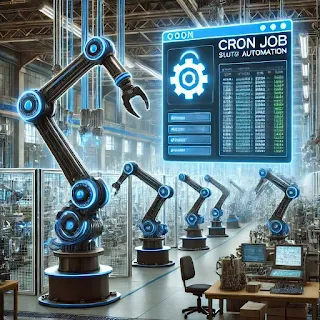Introduction
Automation has become an essential component of modern industries, streamlining processes, reducing human effort, and increasing efficiency. Two critical elements driving automation in different domains are robotics and cron jobs. Robotics has revolutionized manufacturing, healthcare, and even household chores, while cron jobs play a crucial role in automating repetitive tasks in computing and web development.
This article explores the fundamentals of robotics and cron jobs, their applications, advantages, and how they contribute to the growing landscape of automation.
Part 1: Robotics – The Future of Intelligent Automation
What is Robotics?
Robotics is a field of technology focused on designing, building, and operating robots. These machines are developed to function autonomously or semi-autonomously, often taking on tasks that are hazardous or repetitive, reducing the need for human intervention.
Types of Robots
Industrial Robots – Used in manufacturing for assembling, welding, and packaging.
Service Robots – Assist in healthcare, hospitality, and home automation.
Autonomous Vehicles – Self-driving cars and drones for logistics and transportation.
Humanoid Robots – Designed to interact with humans, like Sophia by Hanson Robotics.
Medical Robots – Assist in surgeries, diagnostics, and patient care.
How Robotics is Changing Industries
1. Manufacturing and Industry
Robots perform repetitive assembly-line tasks with precision and speed.
Reduce labor costs and human errors, improving productivity.
2. Healthcare and Medicine
Robotic-assisted surgeries enhance precision and minimize recovery time.
AI-powered diagnostic robots help doctors detect diseases early.
3. Agriculture and Food Processing
Drones monitor crop health and automate irrigation.
Robots in food factories handle packaging and quality control.
4. Military and Defense
Unmanned aerial vehicles (UAVs) assist in surveillance and reconnaissance.
Bomb disposal robots improve safety in hazardous situations.
5. Home and Everyday Use
Smart home robots like Roomba clean floors autonomously.
AI-powered personal assistants enhance daily tasks.
Advantages of Robotics
Increased Efficiency: Robots work continuously without fatigue.
Improved Precision: Eliminates human error in critical operations.
Safety: Reduces human exposure to dangerous environments.
Cost Savings: Long-term reduction in labor costs and operational expenses.
Scalability: Easily deployed in large-scale operations.
Part 2: Cron Jobs – The Automation Backbone of Computing
What are Cron Jobs?
A cron job is a scheduled task in Unix-based operating systems that executes scripts or commands automatically at specified intervals. Cron jobs are widely used in server management, system maintenance, and task automation.
How Cron Jobs Work
Cron jobs rely on a daemon called cron, which runs in the background and executes scheduled tasks based on predefined time intervals set in a crontab (cron table) file.
Applications of Cron Jobs
1. Server Maintenance
Automate system updates and software patches.
Clear cache and temporary files to optimize server performance.
2. Website and Database Management
Schedule backups to prevent data loss.
Run scripts to refresh website content.
3. Email Automation
Send scheduled newsletters or email notifications.
Automate email reminders for upcoming events.
4. Log Management
Rotate and clean up old log files to free disk space.
Monitor system health through periodic logging.
5. Data Processing and Synchronization
Automate data imports and exports between systems.
Sync cloud storage with local drives at set intervals.
Advantages of Cron Jobs
Time-Saving: Reduces manual intervention for repetitive tasks.
Reliability: Ensures tasks run consistently at scheduled times.
Flexibility: Can be configured for any time interval and task type.
Security: Reduces human errors that may arise in manual operations.
Improved Productivity: Frees up developers and IT teams for strategic work.
Robotics vs. Cron Jobs: A Comparison in Automation
How Robotics and Cron Jobs Work Together
While robotics automates physical tasks, cron jobs automate digital processes. In industries like smart manufacturing, cron jobs schedule robot maintenance, firmware updates, and performance monitoring. Similarly, AI-powered robots may use cron jobs to manage data logs and operational schedules.
The Future of Automation with Robotics and Cron Jobs
The future of automation will see increased integration between robotics and intelligent software automation. Some expected advancements include:
1. AI-Driven Robotics
Enhanced machine learning will make robots more adaptable and intelligent.
AI-driven robots will be capable of self-learning and self-repair.
2. Cloud-Based Cron Jobs
Cloud computing will enable cron jobs to run across distributed networks, improving efficiency and scalability.
3. Predictive Maintenance
Cron jobs will schedule predictive maintenance for robots, reducing downtime and operational costs.
4. Internet of Things (IoT) Integration
Smart homes and industries will leverage cron jobs to control robots remotely, automating daily routines and industrial processes.
5. Increased Security Measures
AI-powered security robots will use cron jobs to schedule surveillance activities and process security logs.
Conclusion
Both robotics and cron jobs play vital roles in modern automation. Robotics excels in automating physical tasks, improving efficiency and safety in industries, while cron jobs streamline digital workflows, enhancing productivity in IT and software development. The combination of these technologies is paving the way for a smarter, more automated world where both physical and digital processes function seamlessly together.
As automation continues to evolve, embracing the synergy between robotics and cron jobs will be crucial for businesses and industries seeking to optimize operations, reduce costs, and drive innovation in the era of Industry 4.0 and beyond.

No comments:
Post a Comment